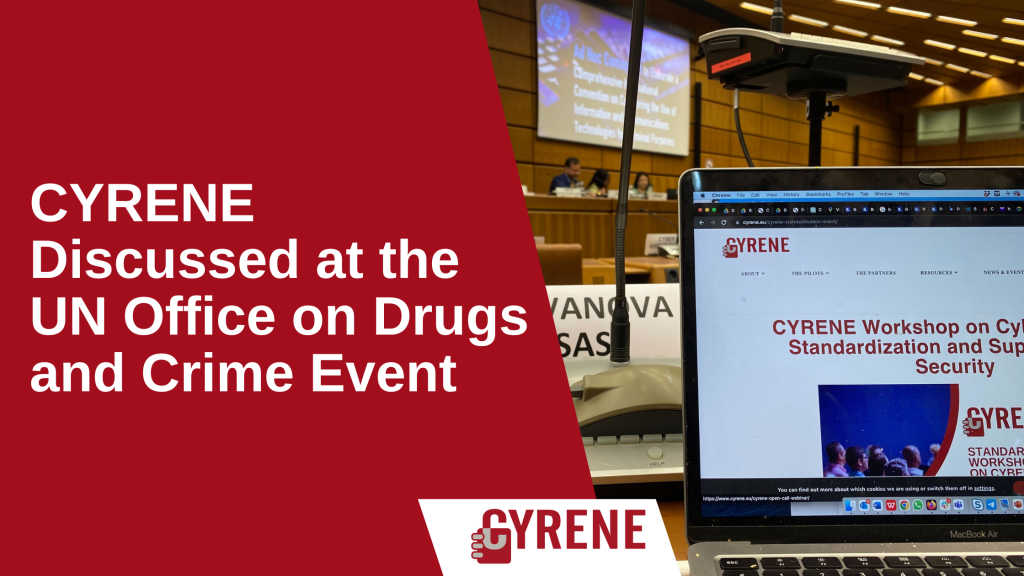
CYRENE Discussed at the UN Office on Drugs and Crime Event
Farhan Sahito from PRIVANOVA presents CYRENE at the Fifth Intersessional Consultation of the Ad Hoc Committee, organised by the UN Office on Drugs and Crime in Vienna
Read MoreIn the new digital era, our critical infrastructures (CIs) are increasingly interconnected and rely heavily on cyber systems to operate efficiently.
Global Supply Chains are a way of life for modern business, becoming more complex and integrated. The organizations that operate within the Supply Chains have become smarter and are not only heavily dependent on Information and Communication Technologies but are also interconnected for exchanging and sharing large amounts of data. Moreover, there is still no easy, structured, standardized and trusted way to forecast, prevent and manage interrelated and propagated cybersecurity vulnerabilities and threats, in a way that takes into account the heterogeneity and complexity of today’s Supply Chains. Therefore, there is a pressing need for devising methodologies, techniques and tools for the efficient evaluation and handling of security threats and vulnerabilities supporting all involved infrastructures for the provision of critical Supply Chain services. CYRENE comes to fill this gap for devising such methodologies, techniques and tools.

Promote trust and confidence to the European consumers and providers/suppliers and pave the way for a competitive and trustworthy Digital Single Market.

Lay the foundation for the implementation of the EU cybersecurity Certification Framework by

CYRENE enhances control and ensures accountability in Information and Communication Technology systems, components and services across a supply chain with the use of a novel, dynamic and evidence based Conformity Assessment Process for handling security threats and vulnerabilities and for evaluating the security and resilience of Supply Chain Services.

Create tailored and risk-based security and privacy certification schemes for trusted supply chains of ICT systems.
Develop a novel dynamic cybersecurity and privacy conformity process that will support different types of conformity assessments.
Develop a collaborative, multi-level evidence-driven Supply Chain Risk and Privacy Assessment Approach
Specify model and simulation services to dynamically forecast, detect and prevent supply chain cyber security and privacy risks and define clear mitigation strategies
Validate the CYRENE solution through its application to real life SC services.
Develop a set of best practices for cybersecurity and privacy conformity assessment for Supply Chain infrastructures (Best Practices and Standards Enhancements)
Strengthen EU’ cybersecurity capacity and tackle future cyber security challenges

Farhan Sahito from PRIVANOVA presents CYRENE at the Fifth Intersessional Consultation of the Ad Hoc Committee, organised by the UN Office on Drugs and Crime in Vienna
Read More
Privanova successfully hosts a standardization workshop on cybersecurity and supply chain security as part of the CYRENE WP7 activities
Read More
CRF successfully demonstrated the CYRENE platform's capabilities in a real scenario for the Automotive Manufacturing industry, marking a significant milestone for the project.
Read More
Delve into the challenges of cybersecurity threats in Supply Chain Services (SCS) and discover CYRENE's innovative solutions.
Read More
Explore the significance of standardisation in Supply Chain Services (SCS) from a CYRENE perspective. Dive into the role of standardisation in enhancing efficiency, security, and resilience against cyber threats in the digital age.
Read MoreHere you can find key definitions used in CYRENE that are relevant to understand the project’s context and approach. The glossary includes a wide range of terms from Cyber Security to Supply Chain and all the relevant areas touched upon in CYRENE.
Project Coordinator: Sofoklis Efremidis
Institution: Maggioli SPA
Email: info@cyrene.eu
Start: 1-10-2020
Duration: 36 months
Participating organisations: 14
Number of countries: 10
 This project has received funding from the European Union’s Horizon 2020 Research and Innovation program under grant agreement No 952690. The website reflects only the view of the author(s) and the Commission is not responsible for any use that may be made of the information it contains.
This project has received funding from the European Union’s Horizon 2020 Research and Innovation program under grant agreement No 952690. The website reflects only the view of the author(s) and the Commission is not responsible for any use that may be made of the information it contains.
